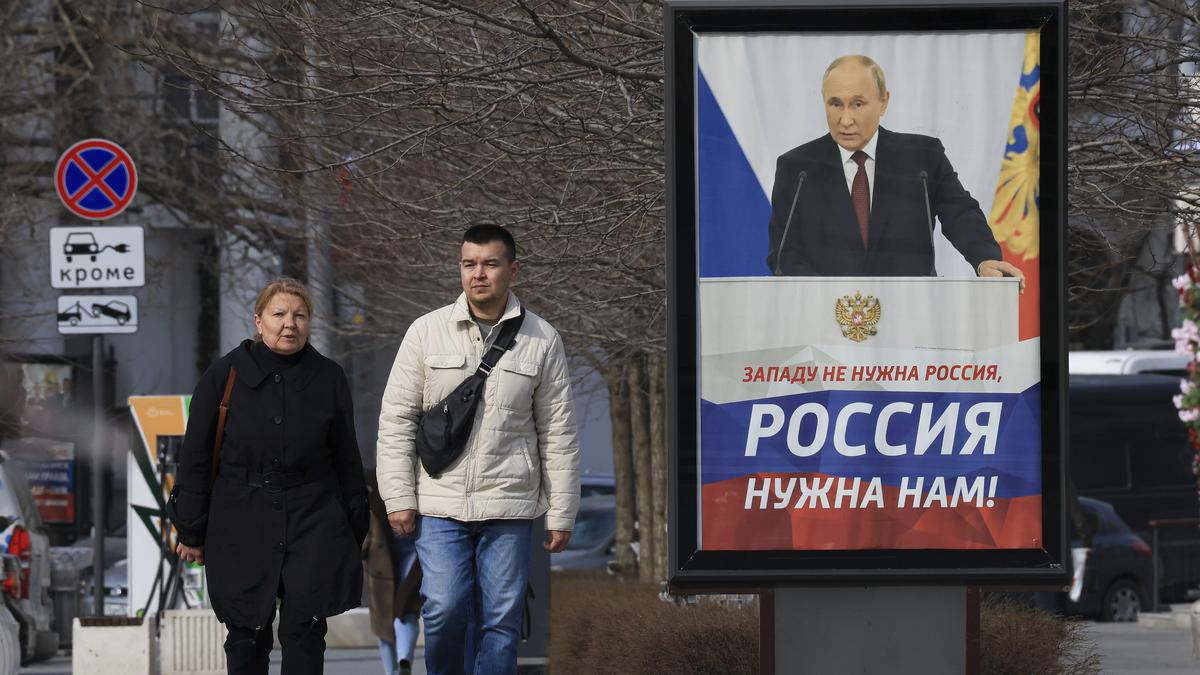
Russians are discovering that a couple of imported staples, like fruit, espresso and olive oil, have shot approach up in worth. Most international manufacturers have disappeared — or been reincarnated as Russian equivalents underneath new, Kremlin-friendly possession. Much more Chinese automobiles are zipping across the streets. Those who desire a explicit luxurious beauty could also be out of luck.
Other than that, not a lot has modified economically for most individuals in President Vladimir Putin’s Russia, greater than two years after he despatched troops into Ukraine. That’s regardless of the sweeping sanctions which have minimize off a lot of Russia’s commerce with Europe, the U.S. and their allies. That sense of stability is a key asset for Mr. Putin as he orchestrates his foreordained victory within the March 15-17 presidential election for a fifth, six-year time period.
Inflation is greater than most individuals would love, at over 7% — above the central financial institution’s aim of 4%. But unemployment is low, and the financial system is predicted to develop 2.6% this 12 months, in line with the International Monetary Fund, double the earlier forecast. That’s far above the 0.9% growth predicted for Europe.
“There are difficulties, of course — they’re connected with the general situation in the world,” mentioned Andrei Fedotov who was strolling down the Tverskaya Street central purchasing avenue a couple of blocks from the Kremlin. “We know this very well, but I believe we’ll overcome them.”
Brand supervisor Irina Novikova was upbeat regardless of greater costs in shops: “More domestic products have appeared, more agricultural products. Yes, we all see that some goods have disappeared.”
“Prices have gone up — if I used to buy three items for a certain price, now I buy one,” she mentioned, however added, “Go look for Russian products, the shops with Russian goods.”
“Industry may have suffered, we know there have been some setbacks in that regard, but again, we’re adjusting and we’re reorienting our thinking, and we’re starting to look to our Chinese friends,” Ms. Novikova mentioned.
Economic enhance
Massive Russian spending for navy gear and hefty funds to volunteer troopers are giving a robust enhance to the financial system. Government-subsidised mortgages are supporting house patrons in a strong kick to the booming building sector, as evidenced by a number of mammoth high-rise developments going up on the banks of the Moscow River.
Inflation rankles, but it surely’s additionally nothing new. Russia grew to become extra self-sufficient in producing its personal meals after 2014, when it took over Ukraine’s Crimea Peninsula and the ensuing Western sanctions led the federal government to ban a broad vary of meals imports from Europe.
Planned authorities spending this 12 months is roughly twice what it was in 2018. Yet the deficit stays manageable as taxes and oil income preserve flowing in.
Not that there aren’t strains on the financial system. Companies face labour shortages after tons of of hundreds of males left the nation after the beginning of the combating in Ukraine to keep away from mobilisation, and tons of of hundreds of others signed navy contracts.
Meanwhile, Russia’s oil exports shifted from Europe to China and India as a result of boycotts by Ukraine’s allies. To keep away from sanctions and a worth cap on oil shipments, Russia needed to shell out billions to purchase a shadow fleet of growing older tankers that don’t use Western insurers who should honour the worth ceiling. Russia additionally misplaced its profitable pure fuel market in Europe after reducing off most of its pipeline provide.
‘The biggest issue’
“The economy plays a very important role in all of Putin’s elections,” mentioned Janis Kluge, an professional on the Russian financial system on the German Institute for International and Security Affairs. “For most Russians, who choose to ignore the war, the economy is really the biggest issue.”
Economic stability “is a signal that Putin can use vis-a-vis the other elites that he is still able to mobilise the masses. And for that, it has to be genuine and not just a manipulated number,” Mr. Kluge mentioned.
“So it is still important that there is this genuine support, even though there is no chance at all for the voters to change who is in office,” he mentioned.
Gross home product stays “an abstract number” to odd folks, and the ruble’s alternate price is much less of an emblem than it was once as a result of most individuals can’t journey and there are fewer imported items to purchase, Mr. Kluge mentioned.
“What matters is inflation,” he mentioned. “And this is an issue where the regime actually did some preparation.”
The central financial institution has been combating worth spikes by elevating rates of interest to 16%. The authorities has supported the Russian forex by requiring exporters to vary overseas earnings from issues like oil into rubles, holding down costs for remaining imports.
And a 6-month ban on gasoline exports from March 1 will assist preserve gasoline costs down in Russia.
The authorities additionally has been providing house mortgages at drastically subsidised rates of interest — a step that will increase folks’s sense of private prosperity however that finally will hit the federal government with a big invoice.
Mr. Kluge mentioned the important thing issue was Russia’s capacity to maintain exporting oil and pure fuel to new clients in Asia.
As lengthy as the worth of oil holds up, Russia can sustain its excessive stage of spending on the navy and social programmes “indefinitely,” He mentioned.
Longer time period, the financial system’s prospects are much less sure. A scarcity of overseas funding will restrict new expertise and productiveness. Government largesse could someday exceed the central financial institution’s capacity to handle inflation. To what extent beneficiant insurance policies will proceed after the election is as much as Mr. Putin.
Source: www.thehindu.com



